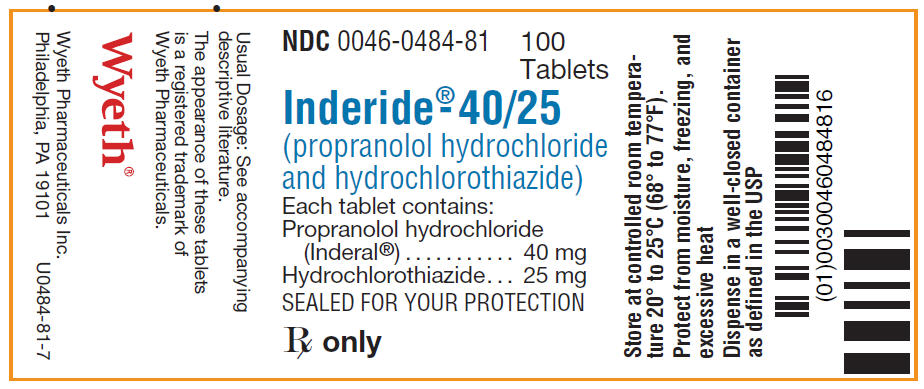
Inderide | Propranolol Hydrochloride And Hydrochlorothiazide Tablet while Breastfeeding
What is Inderide | Propranolol Hydrochloride And Hydrochlorothiazide Tablet used for?
Is using Inderide | Propranolol Hydrochloride And Hydrochlorothiazide Tablet safe or dangerous while breastfeeding?

Nursing Mothers Propranolol hydrochloride (Inderal®) Propranolol is excreted in human milk. Caution should be exercised when Inderide is administered to a nursing woman. Hydrochlorothiazide Thiazides appear in breast milk. If the use of drug is deemed essential, the patient should stop nursing.
Inderide | Propranolol Hydrochloride And Hydrochlorothiazide Tablet Breastfeeding Analsys
Propranolol hydrochloride while Breastfeeding
SafeCAS Number: 525-66-6
Excreted into breast milk in no significant levels and without side-effects observed in breastfed infants from treated mothers.
Hydrochlorothiazide while Breastfeeding
SafeCAS Number: 58-93-5
Thiazide diuretic drug. Excretion into breast milk is clinically non-significant. No side-effects were observed in a one-month old breastfed baby whose mother was treated with this medication. Drug level in the plasma of this child was undetectable. Long-term treatment with diuretic drugs (particularly Thiazide type ones with long-lasting effect and loop-acting mechanism) may inhibit lactation, mostly if lactation is not well-established yet. Use as lower dose as possible, especially during the first postnatal month. American Academy of Pediatrics 2013: Maternal Medication Usually Compatible With Breastfeeding. WHO Model List of Essential Drugs 2002: Compatible with breastfeeding.
Inderide | Propranolol Hydrochloride And Hydrochlorothiazide Tablet Breastfeeding Analsys - 2
Propranolol hydrochloride while Breastfeeding
CAS Number: 525-66-6
Because of the low levels of propranolol in breastmilk, amounts ingested by the infant are small and would not be expected to cause any adverse effects in breastfed infants. Studies during breastfeeding have found no adverse reactions in breastfed infants clearly attributable to propranolol. No special precautions are required. Propranolol has been used successfully in cases of persistent pain of the breast during breastfeeding.[1]
Hydrochlorothiazide while Breastfeeding
CAS Number: 58-93-5
Hydrochlorothiazide doses of 50 mg daily or less are acceptable during lactation. Intense diuresis with large doses may decrease breastmilk production.

What should I do if I am breastfeeding mother and I am already exposed to Inderide | Propranolol Hydrochloride And Hydrochlorothiazide Tablet?
As usage of Inderide | Propranolol Hydrochloride And Hydrochlorothiazide Tablet is mostly safe while breastfeeding hence there should not be any concern. In case of any change in behavior or health of your baby you should inform your health care provider about usage of Inderide | Propranolol Hydrochloride And Hydrochlorothiazide Tablet else no further action is required.
My doctor has prescribed me Inderide | Propranolol Hydrochloride And Hydrochlorothiazide Tablet, what should I do?
Definitely, Inderide | Propranolol Hydrochloride And Hydrochlorothiazide Tablet is safe in lactation for baby. No wonder your doctor has recommended it.
If I am using Inderide | Propranolol Hydrochloride And Hydrochlorothiazide Tablet, will my baby need extra monitoring?
No extra baby monitoring required while mother is using Inderide | Propranolol Hydrochloride And Hydrochlorothiazide Tablet
Who can I talk to if I have questions about usage of Inderide | Propranolol Hydrochloride And Hydrochlorothiazide Tablet in breastfeeding?
US
National Womens Health and Breastfeeding Helpline: 800-994-9662 (TDD 888-220-5446) 9 a.m. and 6 p.m. ET, Monday through Friday
UK
National Breastfeeding Helpline: 0300-100-0212 9.30am to 9.30pm, daily
Association of Breastfeeding Mothers: 0300-330-5453
La Leche League: 0345-120-2918
The Breastfeeding Network supporter line in Bengali and Sylheti: 0300-456-2421
National Childbirth Trust (NCT): 0300-330-0700
Australia
National Breastfeeding Helpline: 1800-686-268 24 hours a day, 7 days a week
Canada
Telehealth Ontario for breastfeeding: 1-866-797-0000 24 hours a day, 7 days a week
